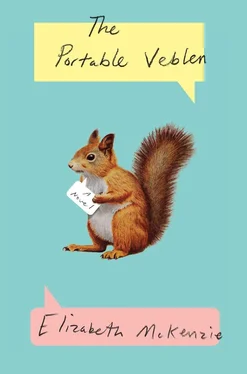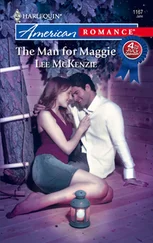“Paul, don’t you see, that’s propaganda to motivate you to buy the thing.”
“But it’s true.”
“This morning it came to the window — I think it wants to befriend me,” Veblen said, quite naturally.
“You can make other friends. This squirrel isn’t a character in a storybook. Real animals don’t wear shawls and top hats and write poetry. They rape each other and eat their own young.”
“Paul, that’s an excessively negative view of wildlife.”
Nevertheless, he seized the wooden chair from beside her desk, took it through the bathroom door, and dumped it in the bathtub, to stand on it and shove aside the square of white, enameled plywood covering the opening to the attic. She provided him with the flashlight from her bedside drawer. His thighs flexed like a warrior’s. A strange little riddle began in her head:
The man pops squirrels, the man pops mice—
(What man? Not Paul?)
With a riddle-me-ree he pops them twice;
(Twice? Isn’t once enough?)
He pops his rats with a riddle-me-ree
(Oh no, it is Paul!)
He popped my father and he might pop me.
(How terrible! Was Paul experimenting with squirrels?)
“Nesting materials in the corner,” he yelled. “God. Looks like fur on the beams!”
Was this the stuff married life would be made of, two people making way for the confounding spectacle of the other, bewildered and slightly afraid?
“Paul, did you know, the year Thoreau spent at Walden Pond, he spent a lot of time totally enchanted by squirrels?” If squirrels were good enough for Thoreau, after all, what was Paul’s problem?
“No, I didn’t.”
“Have I told you about the great squirrel migrations of the past?” She steadied the chair.
“You must have been saving it up.”
“Yeah. Squirrels are actually one of the oldest mammals on earth!” she told him, with curious pride. “They’ve been in North America at least fifty million years. That’s a long time, don’t you think? I mean, people brag about their relatives coming over on the Mayflower in 1620, so I think squirrels deserve a little respect, don’t you?”
She could see him scanning the corners of the attic for entry holes, and he didn’t reply.
“Anyway, settlers and townspeople across North America wrote in their diaries about oceans of squirrels that would flood through the fields and over the mountains, as far as their eyes could see! Can you imagine it? It was like an infinite gray blanket. At times, whole tides of them were seen swimming across rivers, like the Hudson, and the Missouri, and the Ohio. Even Lewis and Clark witnessed a migration! In 1803. In southern Illinois in the 1880s, it was reported that four hundred fifty million squirrels ran through this one area, almost half a billion!”
“This is true?”
“Yes! It’s very well documented.”
“Sounds like a Hitchcock movie.”
For the record, she wished he’d said “Wow!” or “Amazing!” or something flavored with a little more curiosity and awe, because those mass migrations had always represented something phenomenal to her.
“The solidarity is what I love about it, all of them deciding it was time to go and then setting out together,” she tried, for she loved Richard Rorty’s writings on solidarity and had no trouble applying it to squirrels.
“Probably in a blind panic, burning with mange.”
“Paul!”
“I don’t have the same feeling about squirrels, Veb.”
This was upsetting for some reason. Although Paul wasn’t the only person who thought squirrels were nasty, furry bastards with talons like birds and the cold hearts of reptiles.
Even Beatrix Potter’s The Tale of Squirrel Nutkin, a classic of children’s literature, by an introverted woman who generally adored small animals, offered up a pesky idiot-squirrel who riddles a landed authority figure into a fury. But was Nutkin as frivolous as he was made out to be? She had a few theories about that.
“Thorstein Veblen would say people hate squirrels,” she called up to him, “because that’s the only way to motivate expenditures on them — such as buying traps or guns. It’s the same with stirring up patriotic emotionalism, because it justifies expenditures for defense.”
“Uh, what?” He took the sleek apparatus in his grasping hands, then was back on the chair stuffing it somewhere in the dark near the hatch. He said, “I’ll check it every day, you won’t have to think about it. I’ll take it up in the hills where it will live happily ever after. Okay?”
“Whatever, just do it!” she said, biting into her arm.
In addition to biting herself, another way Veblen dealt with emotional distress was to fixate on ideological concerns.
Unhappy that Paul was stuffing a trap into her attic, registering a loss of control that would come with a growing relationship and further compromise, she began to think bitterly about how phenomena in the natural world no longer inspired reverence and reflection, but translated instead into excuses for shopping sprees. Squirrels = trap . Winter’s ragged hand = Outdoor World . Summer’s dog days reigned = Target . Same with traditions — marriage was preceded by the longest shopping list of all, second only to the one after the birth of offspring.
“Paul, take this trap. You impute it with awesomeness because you acquired it and you now believe it’s the crystallization of your desires.”
“Can you bring me a piece of cheese or something?”
She trudged into the kitchen, to look for a snack a squirrel might not enjoy. She had an idea.
“Veblen?” he called.
“Coming.”
“A piece of bread is fine.”
“Okay, just a minute.”
Shortly, she carried in a plate with her offering.
“What’s that?” asked Paul, peering down.
“Sauerkraut sprinkled with mace.”
“Why?”
“I hear they love it,” said Veblen.
She heard him set the plate into the trap with a clap.
• • •
THEY SPENT the afternoon walking and talking about all they were about to face. It would come back to her later that Paul barely mentioned his family that day. Instead he talked a lot about his vision of their material future — the signing bonus for the trial and stock from Hutmacher Pharmaceuticals would allow them to buy a house. “You don’t want to stay in mine?” she asked, surprised. She loved her house.
• • •
HER OWN VISION of the future was of happiness in the air. Something was baking. Children were playing games. There were flowers and substantial trees, and birds were singing in their nests. She was living with someone who was laughing.
Paul gave a sample of laughter.
“That works,” she said.
• • •
SHE WAS STILL very pleased with her little house, and how she’d found it.
Nearly five years ago, having finally escaped from home, she’d been sleeping in her old Volvo by the San Francisquito creek and checking out listings by the dozens for days. She’d seen rooms in dingy, greasy-smelling houses in Mountain View, tiny, dark rooms in houses full of guffawing male engineering students, and a room in the house of a high school science teacher filled with exercise machines.
It was a warm night in September, that night. She had a soulful bottle of beer and a slice of pizza on University Avenue, then walked the neighborhood in the glow of dusk, down streets named for famous poets: Lowell and Byron and Homer and Kipling and the tormented, half-mad Italian poet Torquato Tasso. She crunched the sycamore and magnolia and locust leaves on the sidewalk. Just before she reached the end where the street met the arroyo, she passed a small house so overgrown with vines that the windows were no longer visible. The yard was neck-high with weeds and ivy and morning glory, and in the gentle air of evening she heard the flap of a tarp on the roof, laid over the old shingles to protect them from rain. The chimney was missing a few bricks. Swatches of animal hair were mixed in the litter of leaves up the walkway, as if various creatures regularly rolled on their backs there and stretched out in the sun. The site of the abandoned house, or possibly the dwelling of an old eccentric, filled her with warmth and hope, and perhaps because she lingered there thinking how this might be a positive instance of absentee ownership , she fated her meeting with the person who came down the narrow driveway between the two bungalows, from a yard choked with the summer’s industry of honeysuckle and jasmine.
Читать дальше
Конец ознакомительного отрывка
Купить книгу












